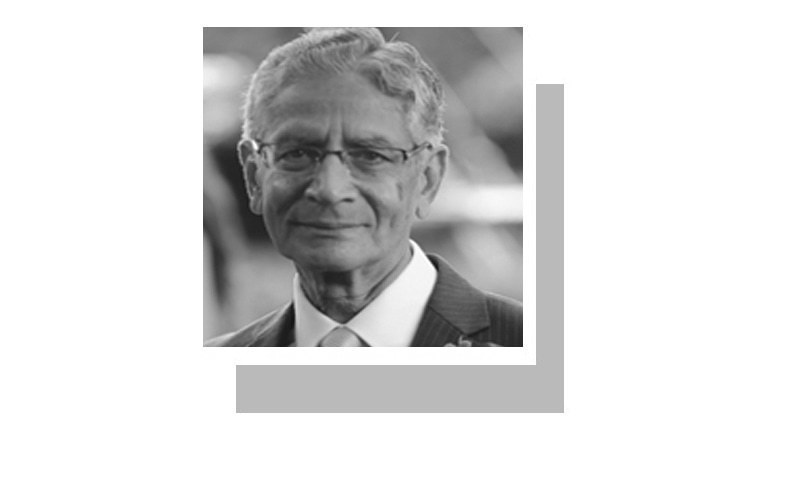PAKISTAN-US relations in recent years have derived largely from Washington’s China and India policies, the Afghanistan war and US national security concerns related to international terrorism. And they have not performed well, leaving both sides unhappy. The Biden administration has given no hint of what comes next.
Pakistan for its part, going by official statements and think tanks reports, is hoping for a reset where relations find their own rationale yet reflect a balance in America’s ties with India and Pakistan, and its consent to Islamabad’s strategic links with Beijing. But Pakistan has given no indication how the competing objectives in its wish list can be reconciled, and hasn’t provided any clues about its own policies to induce the desired change in US policies. All we hear is talk that Pakistan is moving away from geopolitics to geo-economics.
In fact, there’s no such thing as stand-alone geo-economics especially when Pakistan’s value as an economic partner is anything but obvious. Here a little history is relevant. Pakistan’s close relations with the US have historically been a function of geopolitics (1954 to 1965 and 1979 to 1990) or issues relating to US and global security (2001 to 2011). That is where the relations found their logic.
Pakistan seems to be hoping for a reset in ties.
Geopolitics still remains the guiding principle of Pakistan-US relations except that now it provokes conflict. Cooperation is still possible in areas such as stabilisation of Afghanistan and counterterrorism. The US feels that continued Afghan conflict will keep insurgency and terrorism alive, and would not only threaten its own security but by fuelling extremism in Pakistan would also hold the stability of the nuclear-capable country hostage. Jihadists also threaten India, undermining Washington’s China policy. As it is these areas of cooperation between the two sides are also marked by a conflict of perception, policy and interests,
How Washington resolves these dilemmas will depend not only on its China and Afghanistan policies currently under review but also on how compatible Pakistan’s polices will be with US objectives. America does not want to start a new Afghan war. Nor does it want to scuttle the February 2020 agreement entirely. Washington may have lost the war but has not lost the capacity to prevent instability in Afghanistan. However, it will need Pakistan’s help. But there appears to be no clarity in Pakistan’s Afghanistan policy except in rhetoric.
There is also a continued lack of trust in Washington’s policies. Those sceptical of America’s value as a partner need to revisit Pakistan’s own history. To its credit, the US did help Pakistan meet its economic and security challenges earlier. Problems arose in the 1980s and after 9/11 in liaisons between Washington and the Zia and Musharraf regimes struggling to gain legitimacy, economic support and political backing. They made a bad bargain with the US in their own interest rather than Pakistan’s. Sadly, more than suffering at the hands of others Pakistan was a victim of its own poor policy choices and their advancement through an unqualified partnership with the US.
Pakistan’s policies must enjoy domestic support before others respect it. And if Pakistan wants to move from geopolitics to geo-economics it has to reach some understanding with Washington on strategic and security issues, otherwise these will keep colliding with prospects of economic cooperation. And finally, Pakistan has to enhance its value as an economic partner for which it needs to strengthen its economy, free itself from entrenchment in a security-dominated national purpose, and pursue policies that make its excellent geopolitical location a true asset, not a liability. Its real value as an economic partner will not show until Afghanistan stabilises and Pakistan becomes a hub for pipelines and trade with Central Asia.
Pakistan should not seek across-the-board change in its ties with the US. Washington is not interested in broadening the relationship. Pakistan should start modestly with Afghanistan and counterterrorism and build mutual confidence, and then expand the dialogue and agree to cooperate on points of convergence while trying to manage areas of divergence. In the long run, Washington cannot leave Islamabad entirely dependent on China and useful only to Beijing’s strategic purposes. And that is where there is some strategic convergence.
Pakistan should revisit Zulfikar Ali Bhutto’s great idea of ‘bilateralism’. Instead of being concerned over losing China in pursuit of America, Islamabad should worry about gaining internal strength to enhance its appeal to both sides so neither can afford to lose Pakistan. A weak Pakistan would need both China and the US. However, it would have no option but to choose one.
The writer, a former ambassador, is Adjunct Professor Georgetown University and Visiting Senior Research Fellow National University of Singapore.
Published in Dawn, March 13th, 2021












































